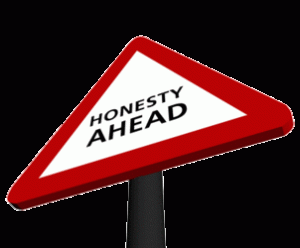What is the BEST policy?
Over the past several weeks I have been examining the concept of honesty. About a month ago I served as a juror on a criminal case in a city near my home. Until this case I don’t think I have every heard so many blatant lies in an eight day period. While under oath (sworn to tell the truth) one particular witness did not recall much more than her own name during her two-day testimony. Police officers, an expert investigator, the ex-girlfriend of the defendant and the daughter of the victim in the case, all gave conflicting stories. Some of their testimony was in direct contradiction to statements made by them in the preliminary hearing months before the trial I was empanelled to decide. I began to entertain the possibility that the phrase “I don’t recall” was synonymous with “I am about to tell a lie”.
Where those statements examples of “little white lies” (deemed to be unimportant fibs that are clearly not the truth and uttered in the interest of being polite), an attempt to save themselves from negative consequences, or an example of the brazen disregard for truth so present in our society today?
Some display an understanding of honesty to be the ability to say whatever is on their minds void of genuine concern for those that may receive the impact of their words. Honesty is often used to mask a judgmental opinion expressed about someone else’s actions. Frequently when disapproving language is used the speaker punctuates the sentence by saying, “ I am being honest”. Does that mean that the listener is to disregard all other statements, which are absent of that phrase?
When the “I am being honest” declaration was made to me recently in a phone conversation, it was voiced in reaction to my lovingly informing the person I was not at the point of participation in a very sensitive situation, which they deemed my participation a requirement. I had given their proposal deep thought, even before it had been voiced to me, because God had already placed it on my heart. I had meditated and prayed about an honest answer, which would reflect both my love for the others involved as I showed love to myself. I know this person was responding out of hurt and frustration. I recognize that no, in any form was not their desired response. I know that my help was seen as the way out of a dark situation. It was as if my choice, because it was not in compliance with their wishes, somehow was the last straw. Then I became “fair game” to be attacked – with this sudden bout of so-called honesty, wrapped in chiding.
It seemed the genuine need to release frustration gave this person a license to unleash part of those feelings on me! Apparently deciding that my honest response to the request was not as significant or relevant as was that person’s “honest” judgmental reaction to my decision. One could have inferred that I would not have gotten the honest response had I fully complied with the request as if it were a command!
Is being honest simply some self-serving notion? Is it acceptable to assume that people are to patiently listen to whatever is expressed under the banner of honesty? What does it reveal about our communication when we make the effort to label particular statements as honest, what does that say about other statements, are they less honest? Likewise when we ask, may I be honest with you, do we need to ask permission? Can we trust that the statement that will follow is truth, somehow more personal or will it be hurtful? When people simply make statements that blame or reprimand under the guise of honesty how do they expect others to respond?
Is honesty the best policy?
Frankly, I have already forgiven the comments, which would have (at another point in my life) caused me great stress and anxiety. I was not manipulated by the negative actions that followed after I took a stand by displaying love during that phone call, first for myself and also for the person on the phone with me. I chose to direct more prayers for that person and the situation. That I can do. My focus will continue to be on responding rather than reacting, that I can do too.
Responding involves thinking, evaluating possible outcomes and then taking action. Reaction is more like a reflex that takes place without much thought. By stopping to think and then taking the appropriate action or by meditating on God’s way of loving my neighbor as myself I am more likely to get the best outcome. Yes, there are times when I miss the mark. There are times when I fall down. When that happens I do my best to repent, apologize and pray. I Take Inventory and Take Action.
When we love ourselves we must set boundaries. As adults we are to be responsible for ourselves, first. Of course we honor the boundaries others have established for themselves that is part of loving them. It takes honesty to Take Inventory. It takes honesty to Take Action.
According to Dictionary.com honest is “1. honorable in principles, intentions, and actions; upright and fair: an honest person.” http://dictionary.reference.com/browse/honest
The 16th president of the Unites States was Abraham Lincoln and also known as “Honest Abe”. This was probably the best known of his many nicknames. This moniker was given to him early. In his working life as a young man he worked in a general store as a clerk. After closing one day, as he counted the money in the cash drawer he found that it was out of balance, a few cents over. He realized that by accident he had given a customer less than accurate change earlier in the day. Lincoln then walked miles to return the money to the customer.
As he became an attorney these types of stories continued to increase and thereby illustrating his integrity and honesty. He was known for not charging full fees to the poor he represented in court. On one occasion he called a witness to the stand and the witness lied. Attorney Lincoln was the only one who knew about the lie. It is reported that when he rose to plead the case he said, “Gentlemen, I depended on this witness to clear my client. He has lied. I ask that no attention be paid to his testimony. Let his words be stricken out, if my case fails. I do not wish to win in this way.” (Source: Kath Crockett, The My Hero Project http://www.myhero.com/myhero/go/specialevents/hero.asp?hero=Lincoln08_honestabe&eid=1)
That is being honest. Honoring principles, even with the possibility of temporary loss, the benefit is visible as we look at the big picture. When we are honest in our relationships (and conversations) we are told in Luke 8:15 God’s word is like seed that falls on good ground when it lands in an honest and good heart, when we hear the word and keep it, yielding the fruit of patience. Luke 6:42 graphically reminds us to take the beam out of our own eye before we attempt to take the splinter from the eye of your brother (or sister). That is honesty!
In Philippians 4:8-9 we are instructed, “Finally, brethren, whatsoever things are true, whatsoever things are honest, whatsoever things are just, whatsoever things are pure, whatsoever things are lovely, whatsoever things are of good report; if there be any virtue, and if there be any praise, think on these things. Those things, which ye have both learned, and received, and heard, and seen in me, do: and the God of peace shall be with you.” (King James Version)
When we are focused on true honesty our conversations and actions will reflect our hearts. The light of love, which dwells inside will be highly visible and even darkness cannot overtake that light!
We can all make the choice to respond with honesty, the best policy!
Love,
Deborah
“Lighting the path to loving your neighbor as yourself.”

